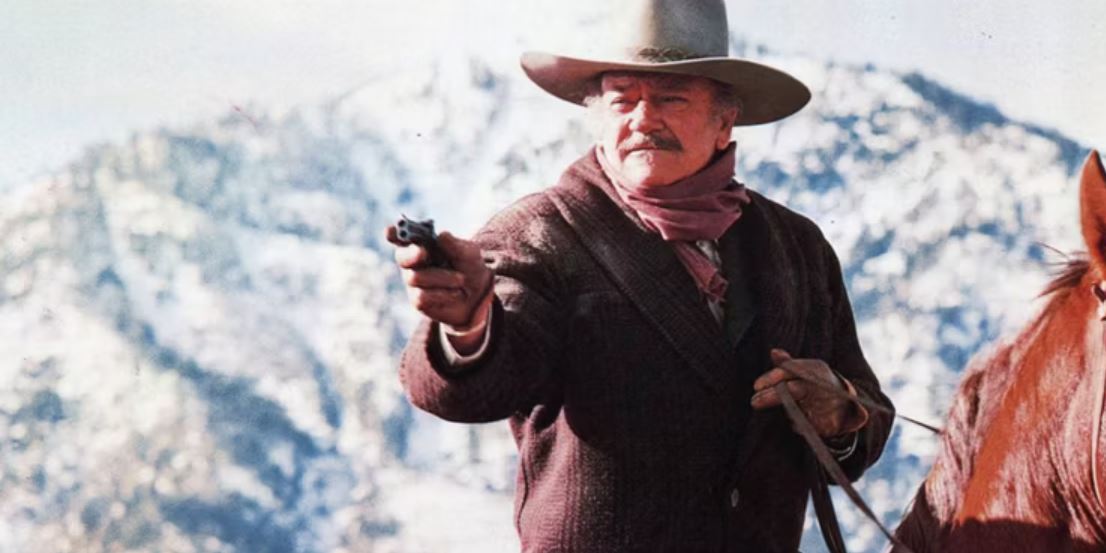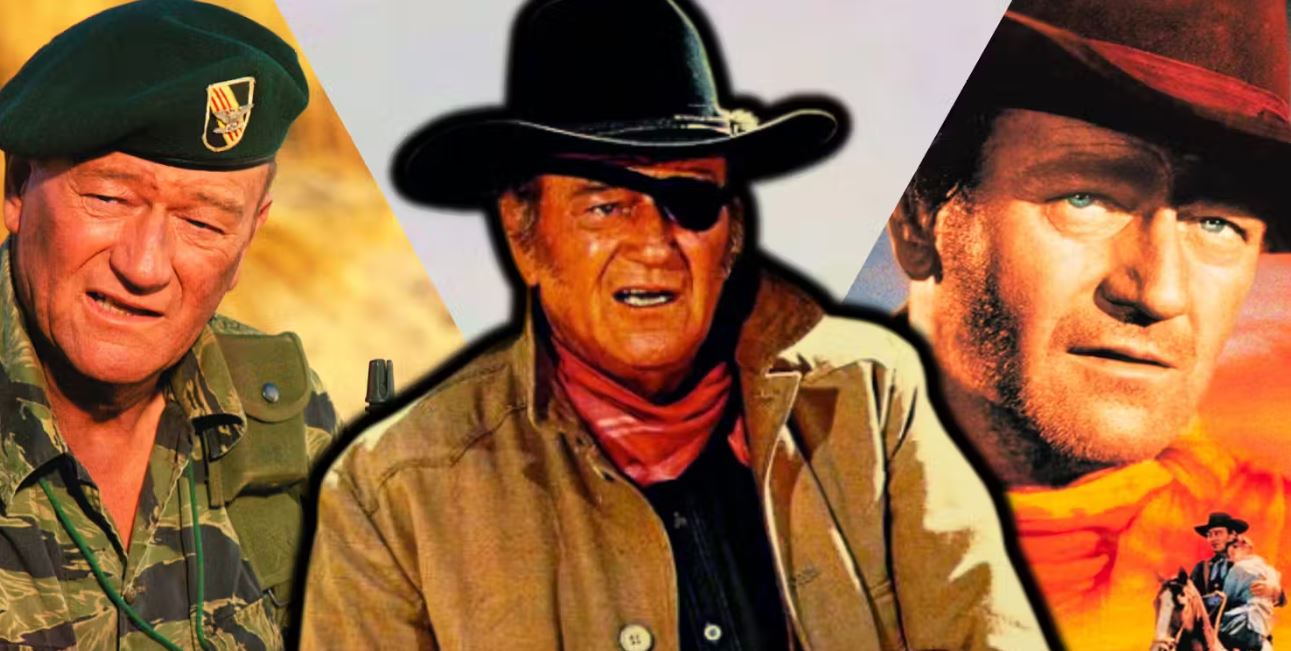From the 1930s on, John Wayne built a reputation for himself as one of America’s biggest movie stars, especially in the Western genre. Often cited as a quintessential male role model and a beacon of masculinity in Hollywood, he often took on the role of the rugged American individualist, especially in the Old West. In one of his more underrated movies, he turned in a career-best performance — and the film had a hidden meaning.
First garnering attention through classic films like Stagecoach and New Frontier, John Wayne became one of the biggest box office draws of the 1950s and ’60s. Through iconic movies like The Searchers, True Grit, and Rio Bravo, he left behind a legacy that defined the Old West for audiences of his era. While morally gray, nuanced characters have since become the norm for Western films, Wayne usually played the part of the all-American hero. However, his career wasn’t entirely without depth or meaningful characterization — and a brilliant film from the 1970s proves this. Tragically dying of cancer, ‘the Duke’ ensured that the last impression audiences had of him would be the best.
The Shootist Tells The Story Of A Dying Gunfighter
Based on Glendon Swarthout’s book of the same name, The Shootist begins with the arrival of an aged gunfighter, JB Books, to Carson City in 1901. With the Old West all but gone, Books isn’t the fearsome gunslinger he once was — though he proves from the start that he’s still the best there is. When he consults a doctor in town about his sickness, his worst fears are confirmed: he is dying of cancer. Despite his violent past, the man is looking to live out his final days in peace, prompting him to rent a room from a kindly widow and single mother, Bond Rogers. Although hesitant to rent to a man of Books’ reputation, Rogers agrees, and the man begins to live the quaint life he has grown to covet. At the same time, he bonds with the woman’s young son, Gillom (played by a young Ron Howard).
As JB Books grows close to the Rogers family, he attracts unwanted attention from every up-and-coming gunfighter who wants to prove his salt as the man who killed the legendary shooter. From attempted ambushes in the dead of night to challengers on the street, the dying man continuously outdraws his adversaries, only making more men flock to town. As becomes close with Bond, he also teaches Gillom how to shoot, something that makes his mother uneasy as she fears he will follow in Books’ footsteps. However, the terminal fighter makes sure to share his moral code with the boy, impressing upon him the importance of not attacking others, only responding in self-defense.
Towards the end of the film, Books has Gillom arrange for three adversarial gunfighters to wait for him in a saloon in town, each of whom has reason to want him dead. With no intention of walking out alive, Books willingly enters the bar, orders a drink and engages the men in a deadly shootout, one of the best in the genre. In this scene, the character is afforded the chance to avoid the suffering of cancer and go out on his own terms, robbing the chancers of the ability to claim him like a trophy. The shooter kills his adversaries but is shot in the back by the bartender, only to be avenged by Gillom. However, before Books passes, he watches the boy toss the gun away — signaling that he won’t follow in Books’ footsteps.

How The Shootist Mirrored John Wayne’s Tragic Demise
The Shootist, despite not being written for Wayne, was the perfect final film for the iconic actor. With Wayne himself battling cancer, something he was first diagnosed with in 1964, he was afforded a great opportunity to show America what he was made of one last time. Just as Books makes a point of showing the world he truly is the best and goes down shooting, Wayne turned in one of his all-time best performances. The film isn’t the action romp of Tombstone, nor the classic Western of Rio Bravo, or the adventure of The Good, the Bad, and the Ugly. Instead, it’s the examination of the cycle of violence, the final days of an aged gunfighter just looking for some peace.
Something key to note about the character of JB Books is how he bucks the traditional trope of older gunfighters being repentant. Instead, the shootist stands by his past deeds, stating he never killed anyone who didn’t deserve it. This is shown by his creed: “I won’t be wronged, I won’t be insulted, and I won’t be laid a hand on. I don’t do these things to other people, and I require the same from them.” Even this side of Books somewhat represents Wayne’s own public persona, often shying away from regrets and standing by his opinions and actions, no matter how controversial they may have been. And, it’s important to note, that the actor wasn’t without controversy, and had no shortage of divisive opinions, both regarding American history and politics. Like it or hate it, Wayne stood by America, just as Books stood by his own history. Thematically, this made for a brilliant pairing of actor and character.
As the last performance of a dying man, The Shootist brought out the best in Wayne, both as an actor and a Hollywood presence. While Clint Eastwood had been in talks for the role, nobody was in as good a position to play the part of JB Books as John Wayne. For him, he wasn’t just playing a role, he was living the very life of his character. Rather than pretend to know what it was like to suffer from cancer, Wayne had a very real experience to draw on. The actor continued his battle with cancer for three years after the release of the film, before finally passing away in 1979, though The Shootist was the last picture he ever played in.
What The Shootist Means For Westerns
The Shootist marked the end of an era for both Hollywood and Westerns. As John Wayne’s last film, it symbolized the official end of the classical Western, as the genre shifted towards stories about flawed, nuanced characters like The Outlaw Josey Wales — which, incidentally, was released the same year as The Shootist. While the film wasn’t as classic a case of good versus evil as Wayne’s past movies, it did retain the same tone of the decent gunfighter proving his worth against no-good killers that defined the actor’s career. By contrast, many of the Westerns that followed were centered around moral ambiguity and downplayed the idea of absolute good versus evil.

Without The Shootist, it’s unclear if Clint Eastwood had gone on to make Unforgiven, a story that mirrors some of the same themes as Wayne’s final movie. The 1992 movie is almost a thematic inversion of Wayne’s final film, playing up a regretful aged gunfighter who takes on one last job. Both films end with similar shootouts, both set in a saloon, though where Eastwood’s Munny survives, Wayne’s Books goes down in a hail of bullets. Both characters are retired gunfighters, each one dealing with their past in different ways, and each one drawn back into a life of violence one last time. The Shootist mirrors Wayne’s classical ethos on the Old West, that it was a time of good men doing what was necessary for others. Meanwhile, Unforgiven mirrors Eastwood’s more revisionist, grounded take on the realities of the West.
With Wayne’s career, both as a Hollywood icon and Western cowboy over, the torch had firmly been passed down, and the film industry was ready for a new era. In many ways, The Shootist was even a rebuke of the tone of ’70s cinema, which was famously bleak, downbeat, and full of character deconstruction. Wayne’s film doesn’t focus on the flaws, regrets, or imperfections of Books. Rather, it establishes the character as a formidable, legendary gunfighter and follows him as he finds new meaning before his passing, as a mentor and surrogate father to Gillom. His demise isn’t unexpected, rather the film lets him go out on his own terms doing something noble — and leaves behind a stark warning against violence. In that sense, it was as classic a Western as it gets, standing alongside Shane in some of its themes and messages.
The Shootist Is One Of Hollywood’s Best Career Send-Offs
John Wayne left behind one of the most iconic and influential careers in Hollywood history, both in and outside the Western genre. As the face of American masculinity and an embodiment of rugged individualism, the actor mastered the persona of a good guy who does the right thing, no matter the odds. While some of his films were almost cheesy in their depictions of patriotism, he took on roles that had more depth than people give him credit for. As a final film, The Shootist reminded everyone of the depth to which Wayne was capable, the same acting prowess that won him the Oscar for True Grit.
John Wayne’s passing signified the end of an era for Hollywood, and a new direction for Westerns as Clint Eastwood continued to lead the genre for another two decades, culminating in Unforgiven. The influence of Wayne’s powerful, emotionally charged last role on his peers and successors is hard to deny. In The Shootist, John Wayne left the film industry with one of the Western genre’s best shootouts, a masterfully acted character study, and one of the best career send-offs any actor could hope for.
